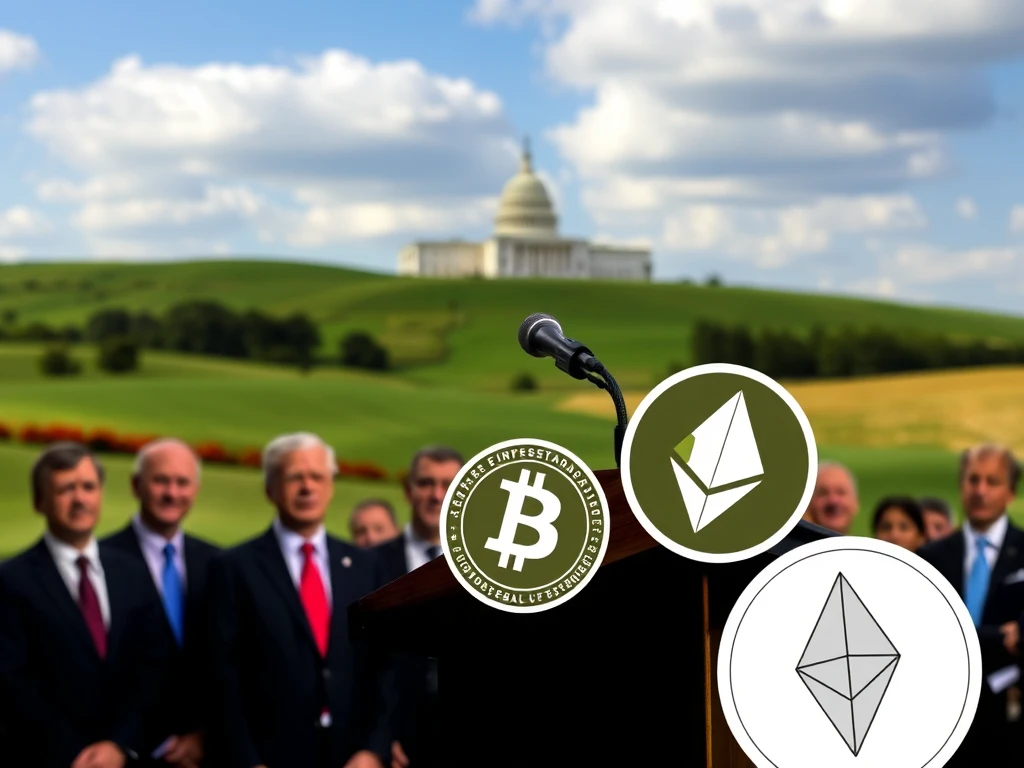Urgent Conflict: Trump Sidesteps Crypto Divestment Question

The intersection of politics and digital assets is under scrutiny as questions arise regarding potential conflicts of interest impacting future crypto regulation. A recent press briefing highlighted these concerns, specifically targeting former President Donald Trump and his family’s involvement in the cryptocurrency space. The core issue revolves around whether personal financial interests could influence policy decisions and the passage of key legislation for the burgeoning industry.
What Did Trump Say About His Crypto Ventures?
During a recent press briefing, a reporter directly asked Donald Trump if he would consider divesting from his family’s Trump crypto ventures to alleviate political pressure on digital asset bills in Congress. Trump did not directly answer the question about divestment. Instead, he framed his involvement and support for crypto as being about the importance of the industry itself for the United States. He stated that he views crypto as an industry the U.S. has come to dominate, suggesting that if the U.S. didn’t have it, countries like China would. He emphasized the industry’s power as being more significant than personal investments.
His response underscores a key challenge in the ongoing debate: balancing personal financial interests with the development of national policy. This is particularly relevant for the digital asset space, which is still navigating its regulatory framework in the U.S.
Conflict of Interest Concerns Threaten US Crypto Policy
Several Democratic lawmakers have voiced significant concerns that potential conflicts of interest, particularly those linked to the former president and his family’s crypto activities, could obstruct the passage of necessary legislation. They argue that they may not support crypto bills if these conflicts are not adequately addressed. This political dynamic creates uncertainty for the future of US crypto policy.
The concern isn’t merely theoretical; lawmakers are taking action. For instance, California Senator Adam Schiff recently introduced the Curbing Officials’ Income and Nondisclosure (COIN) Act. This proposed bill aims to prohibit the president, his family, and executive branch officials from issuing or endorsing any digital asset. Schiff explicitly stated the bill’s purpose is to address what he described as ‘corruption in plain sight’ related to officials profiting from crypto schemes.
How Does Conflict of Interest Impact Crypto Regulation Efforts?
The growing debate over potential conflicts poses a direct threat to the bipartisan momentum that has been building towards establishing comprehensive crypto regulation. While there’s general agreement on the need for clear rules, the political controversy surrounding personal financial ties risks derailing these efforts. The recent Senate vote on the GENIUS Stablecoin bill highlighted this tension, as proposed amendments aimed at limiting a president’s involvement in the crypto industry were not included.
Experts and former regulators have also raised warnings about the need to address these potential conflicts transparently as Congress considers market structure for digital assets. The core challenge is ensuring that regulatory decisions are made based on sound policy principles for the entire market, rather than being influenced by the personal financial stakes of key political figures.
Navigating the Future of US Crypto Policy
The path forward for US crypto policy remains complex. While the industry continues to grow and seek regulatory clarity, the political environment is complicated by questions of ethics and potential conflicts. The focus on Donald Trump‘s crypto connections is a prominent example of how these issues can become central to the legislative process. The debate over divestment and the introduction of bills like the COIN Act demonstrate lawmakers’ intent to address these concerns head-on. The resolution of these issues will likely play a significant role in determining the speed and shape of future crypto regulation in the United States, impacting everyone from large institutions to individual investors involved in Trump crypto and other digital assets.
Summary: Political Hurdles for Crypto Legislation
In conclusion, former President Donald Trump‘s decision to sidestep questions about divesting from his family’s crypto ventures has intensified the debate around potential conflicts of interest in Washington. This controversy threatens to slow down or complicate efforts to pass crucial crypto regulation. As lawmakers propose measures like the COIN Act to address these concerns, the interplay between personal financial interests and national US crypto policy remains a critical challenge for the industry’s future.









